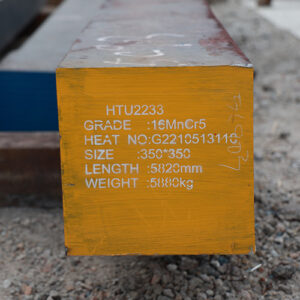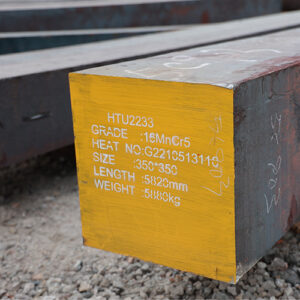Introduction

Hot rolled steel flat bars are vital in modern industry due to their unmatched strength, versatility, and cost-effectiveness. These bars are formed through a hot rolling process that enhances their mechanical properties, making them suitable for various applications across multiple sectors. This blog delves into the top applications of hot rolled steel flat bars, illustrating their importance and the impact they have on contemporary manufacturing and construction.
What is Hot Rolled Steel Flat Bar?
Hot rolled steel flat bars are produced by heating steel above its recrystallization temperature and then shaping it into flat bars. This process results in enhanced ductility and malleability, allowing for easier fabrication and manipulation. The hot rolling process also helps to maintain the steel’s strength while allowing it to be formed into various shapes and sizes. Typically available in various dimensions, hot rolled steel flat are a preferred choice in industries where strength and durability are paramount.
Properties of Hot Rolled Steel Flat Bar
| Property | Value |
|---|---|
| Yield Strength | 250-400 MPa |
| Tensile Strength | 400-550 MPa |
| Elongation | 15-25% |
| Thickness Range | 3mm – 100mm |
| Width Range | 20mm – 300mm |
Construction Industry
The construction industry is one of the largest consumers of hot rolled steel flat bars, leveraging their strength and durability for various structural applications. These bars are essential for constructing buildings, bridges, and infrastructure, providing a solid foundation and support. Their high yield strength allows engineers to use them in load-bearing applications, ensuring safety and reliability in structural design.
Key Uses:
- Structural Beams and Columns: Hot rolled steel flat bars are commonly used in the creation of beams and columns, forming the skeleton of structures. Their robustness allows buildings to withstand significant weight and external forces.
- Reinforcement Bars in Concrete: Often utilized alongside concrete, hot rolled steel flat bars enhance the tensile strength of reinforced concrete structures, ensuring stability and longevity.
- Bracing and Support Systems: In addition to beams and columns, these bars serve as braces that provide additional support to structural frameworks, helping to prevent lateral movement during high winds or seismic events.
Manufacturing and Fabrication
In manufacturing, hot rolled steel flat bars are indispensable for fabricating various components and machinery. Their versatility allows manufacturers to create tailored parts that meet specific operational requirements. This application is critical in sectors such as automotive, aerospace, and heavy machinery, where precision and reliability are essential.
Key Uses:
- Machine Bases and Frames: Hot rolled steel flat provide the structural integrity needed for machine bases, ensuring stability during operation and minimizing vibrations.
- Custom Brackets and Mounts: Manufacturers often use these bars to produce custom brackets and mounts, facilitating the assembly of machinery and equipment with precision.
- Fabricated Components for Machinery: From conveyor systems to specialized equipment, hot rolled steel flat bars are essential in creating durable components that withstand operational wear and tear.
Automotive Industry
The automotive industry is a major consumer of hot rolled steel flat bars, utilizing them for various critical applications. The strength and durability of these bars make them ideal for producing parts that must endure high stress and dynamic loads, ensuring vehicle safety and performance.
Key Uses:
- Chassis and Structural Components: Hot rolled steel flat bars are widely used in the construction of vehicle chassis, providing the necessary strength to support the vehicle’s weight and structural integrity.
- Suspension Systems: The automotive suspension system relies on strong, durable components; hot rolled steel flat bars are often used to manufacture these crucial parts, contributing to vehicle stability and safety.
- Brackets and Mounting Frames: These bars are commonly used to create brackets and mounting frames for various automotive applications, ensuring components are securely fastened and positioned.
Energy Sector
The energy sector, particularly oil and gas, extensively utilizes hot rolled steel flat bars in various applications. Their high strength and resistance to harsh environments make them suitable for constructing pipelines, platforms, and other critical infrastructure needed for energy production and distribution.
Key Uses:
- Pipeline Construction: Hot rolled steel flat bars are fundamental in building pipelines that transport oil and gas, ensuring they can withstand high pressures and harsh environmental conditions.
- Structural Components for Rigs: Offshore and onshore drilling rigs require robust structural components; hot rolled steel flat provide the necessary strength to support these massive structures.
- Support Beams for Energy Plants: These bars are often employed in constructing support beams for energy plants, ensuring that the structural integrity of these facilities is maintained throughout their operational lifespan.
Shipbuilding and Marine Applications
Hot rolled steel flat bars are crucial in shipbuilding and marine applications due to their ability to withstand the corrosive marine environment. Their strength and durability are essential for constructing hulls, decks, and other critical structural elements of ships and boats.
Key Uses:
- Hull Construction: Hot rolled steel flat bars are commonly used in the fabrication of ship hulls, providing the necessary structural integrity to withstand the harsh marine conditions.
- Deck Supports: These bars serve as deck supports, ensuring that the ship’s decks can handle heavy loads and resist deformation over time.
- Structural Reinforcements: In addition to primary structural components, hot rolled steel flat bars are often used for reinforcements throughout the ship, enhancing overall stability and safety.
Agricultural Equipment
In agriculture, hot rolled steel flat bars are used to manufacture durable equipment designed to withstand harsh conditions and heavy usage. From tractor frames to various implements, these bars provide the strength and longevity required in agricultural applications.
Key Uses:
- Farm Machinery Frames: Hot rolled steel flat bars form the backbone of various farm machinery, ensuring they can endure the rigors of agricultural work.
- Implements and Attachments: Many agricultural implements, such as plows and cultivators, utilize hot rolled steel flat bars to maintain structural integrity while in use.
- Structural Components for Equipment: Hot rolled steel flat bars are often used in constructing structural components for agricultural equipment, ensuring reliability and performance under tough conditions.
Furniture and Design
In recent years, hot rolled steel flat bars have gained popularity in furniture design and construction due to their industrial aesthetic and robust properties. Designers and manufacturers use these bars to create modern, functional furniture pieces that appeal to contemporary tastes.
Key Uses:
- Structural Frames for Furniture: Hot rolled steel flat bars are commonly used in the frames of tables, chairs, and other furniture pieces, providing the necessary strength and stability.
- Decorative Elements: Beyond structural uses, these bars can also serve as decorative elements in furniture design, adding an industrial touch to modern decor.
- Custom Designs for Interior Applications: The versatility of hot rolled steel flat bars allows for custom designs tailored to specific interior applications, making them a popular choice among designers.
Industries Using Hot Rolled Steel Flat Bar

| Industry | Application |
|---|---|
| Construction | Structural components |
| Manufacturing | Custom machinery parts |
| Automotive | Chassis and frames |
| Energy | Pipeline and structural support |
| Marine | Ship hulls and decks |
| Agriculture | Durable farm equipment |
| Furniture | Industrial-style furniture |
Conclusion
Hot rolled steel flat bars are indispensable across various industries, thanks to their strength, versatility, and durability. From construction to automotive, energy, and even furniture design, these bars serve critical functions that contribute to the overall efficiency and safety of industrial applications. As industries continue to evolve, the demand for hot rolled steel flat bars will likely grow, further solidifying their place in modern manufacturing and construction.
FAQ
Q:What is the difference between hot rolled and cold rolled steel?
A:Hot rolled steel is processed at high temperatures, leading to better malleability, while cold rolled steel is processed at room temperature, offering higher precision and a smoother surface finish.
Q:Can hot rolled steel flat bars be welded?
A:Yes, hot rolled steel flat bars can be welded, making them suitable for various structural and fabrication applications.
Q:How do I choose the right size of hot rolled steel flat bar for my project?
A:Choosing the right size depends on the specific application requirements, including load-bearing capacity, dimensions, and design specifications. Always consult with a structural engineer when in doubt.
Q:Are hot rolled steel flat bars corrosion-resistant?
A:While hot rolled steel offers strength, it is not inherently corrosion-resistant. However, applying protective coatings or using galvanized steel can enhance corrosion resistance.
Q:What are the common grades of hot rolled steel flat bars?
A:Common grades include A36, A572, and S235, each suitable for different applications based on strength requirements and structural specifications.
